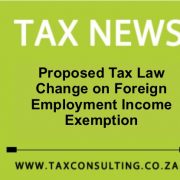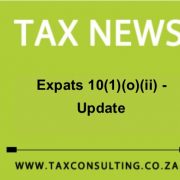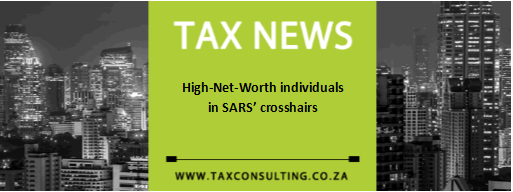Maggie Kgobane(Tax Expert) live on Yilungelo Lakho
/in Latest News, News & Articles, Recent Highlights/by tax consultingMaggie Kgobane was interviewed on Tax related matters with SARS Manager Thokozani Mzantsi and Advocate Ombudsman Eric Mkhawane of SARS on Yilungelo Lakho on SABC 1 on the 10th of July 2017. Maggie shared her expertise with utmost confidence.
She addressed questions that are frequently asked by taxpayers regarding Taxation and included useful guidelines that should be followed when filing your tax return. Tax Consulting South Africa is very proud of Maggie’s sterling performance on national television.
Please see below a clip of the interview:
A repeat of the interview will air at 22:00 on 2017-07-13 on SABC 1
SARS Sets Sights on High-Net-Worth Individuals
/in Latest News, News & Articles/by tax consultingHigh-net-worth individuals (HNWIs) will find themselves under greater scrutiny from SARS in the immediate future says Jerry Botha, Managing Partner at Tax Consulting South Africa. “In reviewing the SARS Annual Performance Plan for 2017 to 2018,” he states, “one will notice that they have highlighted low compliance of HNWIs as a strategic risk.”
Botha notes this is in addition to the 12% of taxpayers on the register which SARS will audit for the next year.
The South Africa 2017 Wealth Report, published by Research and Markets, indicates that the country is home to some 40,400 HNWIs with a combined wealth of US$171-billion. If many of these individuals are not meeting their tax obligations, as SARS believes, a substantial amount of revenue is being lost per annum.
SARS Upping its Detection Abilities
SARS’ response to this perceived threat to revenue collection will be to “develop and acquire capability to effectively tackle HNWIs and their related trusts, and redefine taxpayers in this segment.” The document also states that one approach the tax authority will take to enforce compliance is “increased and targeted audits”. The text goes on to say that 130 HNWIs can expect to be audited in the 2017/2018 tax year.
SARS has also committed itself to complete its implementation of the Organisation for Economic Cooperation and Development’s (OECD) Common Reporting Standard (CRS) by end of December 2017. This means that there can effectively no longer be offshore hidden money, as the world has followed the United States’ lead in forcing disclosure by financial institutions of any account owned or otherwise connect to South African residents or citizens.
Legislation to Tackle Loopholes
Apart from SARS’ activities, new legislation is being developed to close loopholes that are often exploited to reduce one’s tax obligation. A recent example is the Taxation Laws Amendment Act 15 of 2016 that redefines the forgone interest on low-interest or interest-free loans to a trust as a donation, thereby making the lender liable for donations tax.
“My advice to every High Net Worth Individual is to realise that their options for avoiding taxation, legal or otherwise, are shrinking,” says Botha. “It’s important that they get their financial affairs in order and, if necessary, make use of the leniency SARS is offering in terms of voluntary disclosure. The most effective measure is that High Net Worth Individuals should self-audit their structures and ask themselves the tough questions. Once SARS asks these questions and you are found wanting, the penalty regime means your penalties alone will mostly be more than the actual taxes
As far as this self-disclosure is concerned, Botha is referring to SARS’ Special Voluntary Disclosure Programme by which taxpayers can reveal undeclared income at reduced penalties and without fear of prosecution. However, he warns that the final date for this allowance is 31 August 2017, so those wishing to take advantage of it should act promptly.
Be Prepared
As financially astute as they are, wealthy individuals should be wary of approaching tax matters unprepared, whether it’s an audit, voluntary disclosure or other related issue. There are cases where a special voluntary disclosure is not required and a standard voluntary disclosure will suffice. When being audited, offering the right answers to an auditor’s pointed questions makes all the difference to the outcome.
Understanding the nuances and configurations of an ever-changing tax landscape and how to respond to them is key to wealth preservation. Botha urges those of high net worth to engage a strong legal, financial and tax team. “Having dealt with HNWIs and complex tax matters over the years,” observes Botha, “I can confidently say that those who have a strong team of specialists are better prepared to handle any eventuality.”
[button url=”mailto:contact@taxconsulting.co.za?subject=Urgent Client Contact Request (High-Net-Worth)- www.taxconsulting.co.za (Latest News)” target=”” size=”small” style=”black” icon=”” popup=”” title=””]contact@taxconsulting.co.za[/button]
Who should Complete a Tax Return? Government Gazette, 9 June 2017
/in Latest News, News & Articles/by adminIn terms of section 25 of the Tax Administration Act, 2011, Commissioner for SARS Tom Moyane promulgated Public Notice 547, which sets out the requirements for which persons how to submit income tax returns for 2017 year of assessment. In terms of section 25 of the Tax Administration Act, read with section 66(1) of the Income Tax Act, persons specified in terms of paragraph 2 of the Public Notice 547 are required to submit an income tax return within the prescribed period in paragraph 4 of the said Public Notice.
As the tax season of 2017 opens in just under two weeks, we shall examine the various categories of persons who are compelled by the Public Notice to submit income tax returns for 2017, as well as other important matters referring to the 2017 filing season.
Who must Submit Income Tax Returns for 2017 Year of Assessment
Both resident and non-resident companies, trusts or other juristic persons, who carried on a trade through a permanent establishment in the Republic, derived income from a source in the Republic, derived any capital gain or capital loss from the disposal of an asset to which the Eighth Schedule to the Income Tax Act applies, every company incorporated, established or formed in the Republic, but which is not a resident as a result of the application of any agreement entered into with the Government of any other country for the avoidance of double taxation, are liable to submit income tax returns for 2017 year of assessment..
All resident and non-resident natural persons, who:
Carried on any trade (other than solely in his or her capacity as an employee);
- Was paid or granted an allowance or advance as described in section 8(1)(a)(i) of the Income Tax Act (other than an amount reimbursed or advanced as described in section 8(1)(a)(ii)) and whose gross income exceeded the thresholds set out in paragraph (4) below;
- Was granted a taxable benefit described in paragraph 7 of the Seventh Schedule to the Income Tax Act and whose gross income exceeded the thresholds set out in paragraph (4) below;
- Are residents and had capital gains or capital losses exceeding R40 000, and for non-residents who had capital gains or capital losses from the disposal of an asset to which the Eighth Schedule to the Income Tax Act applies;
- Is a resident who held any funds in foreign currency or owned any assets outside the Republic, if the total value of those funds and assets exceeded R225 000 at any stage during the 2017 year of assessment;
- Is a resident who had any income or capital gains from funds in foreign currency or assets outside the Republic;
- Is issued an income tax return form or who is requested by the Commissioner in writing to furnish a return, irrespective of the amount of income of that person;
- Is an estate of a deceased person that had gross income;
- Is a non-resident whose gross income included interest from a source in the Republic and is not subject to the exemptions contained in Section 10 (1) (h) of the Income Tax Act
- Is a representative taxpayer of any persons are all liable to submit and file income tax returns for 2017 year of assessment.
Who is Exempt from Submitting Income Tax Returns
Natural persons and estates of deceased persons, if the gross income of that person consisted solely of gross income, such as remuneration paid or payable from one employer, which does not exceed R350 000 and employees’ tax has been deducted or withheld in terms of the deduction tables prescribed by the Commissioner, dividends received by, or accrued to natural persons who were non-residents throughout 2017 year of assessment; and amounts received or accrued from a tax-free investments, do not need to file income tax returns. In addition to this requirement, interest (other than interest from a tax-free investment) from a source in the Republic not exceeding:
- R 23 800 for natural persons below the age of 65 years;
- R 34 500 for natural persons aged 65 years, or older;
- R 23 800 for the estates of deceased persons is not subject to income tax.
Natural persons, who have received income not exceeding R 75 000 per year for persons under the age of 65 years; R 116 150 per year for persons older than 65 years, but under the age of 75 years and R 129 850 per year for persons older than 75 years will not be liable to submit and file income tax returns for 2017 year of assessment.
Deadlines for Income Tax Returns Submissions
The periods within which income tax returns must be furnished are for companies within 12 months after the end of the financial year end and for all other persons, which includes natural persons and trusts:
- On, or before 22 September 2017 for all manually submitted income tax returns;
- On, or before 24 November 2017 for all income tax returns submitted by using the SARS eFiling platform or electronically through the assistance of a SARS official at an office of SARS;
- On, or before 31 January 2018 if the return relates to a provisional taxpayer and is submitted by using the SARS eFiling platform.
Forms of Income Tax Returns
The forms prescribed by the Commissioner for the submission of income tax returns are obtainable on request via the internet at www.sarsefiling.co.za or from any office of SARS, other than an office which deals solely with matters relating to customs and excise.
Good luck with the submissions of your income tax returns! We are here to assist you if you need any advice and guidance for the completion and submission of your income tax return, or if you are aggrieved by the assessment received from SARS.
Herewith a link for ease of reference:
[button url=”mailto:contact@taxconsulting.co.za?subject=Urgent Client Contact Request (Gazette 9 June)- www.taxconsulting.co.za (Latest News)” target=”” size=”small” style=”black” icon=”” popup=”” title=””]contact@taxconsulting.co.za[/button]
Sayonara to Tax Free Earnings
/in Latest News, News & Articles/by adminSayonara to Tax Free Earnings
The proposed amendment to section 10(1)(o)(ii), the exemption section referred to often as the so-called 183-and-60-day rule aims to limit the current tax-free earning situation of South African tax residents working abroad.
Under the current regime, taxpayers who are resident in the Republic and earn an income under a foreign flag, are exempt from paying tax on that income under 183-and-60-day rule. The proposed amendment aims to remove this exemption for taxpayers who are not taxed in the country in which they render their employment services.
There is currently no certainty as to when the proposed change will occur, given that it was announced at the 2017/2018 budget speech by current Finance Minister, Pravin Gordhan and there has, thus far, been no invitation for commentary by the public. More importantly, will the date promulgation of the amendment and the effective date differ? Will SARS apply the change retrospectively as it so surreptitiously did with employee relocation allowances?
In future, on the anticipated law change, an employee will need to prove that the income received for employment services abroad was taxed in the country in which the services were rendered. Without being able to prove this, the employee would not enjoy the benefit of the current tax exemption. On a side note, this will only be in reference to income tax on the employment income and not VAT, dividends tax or corporate tax.
Where the taxpayer remains tax resident, South African expatriates abroad must accept that the days of earning completely tax-free are over. Naturally, with the correct expert advice, avenues can be sought to reduce the impact of this proposed amendment.
Naturally, we await progress with eager anticipation and will keep our clients abreast of any news hereon.
[button url=”mailto:contact@taxconsulting.co.za?subject=Urgent Client Contact Request – www.taxconsulting.co.za (Sayonara to Tax Free Earnings)” target=”” size=”small” style=”black” icon=”” popup=”” title=””]contact@taxconsulting.co.za[/button]SARS to Exchange Tax Information with over 50 Jurisdictions
/in Latest News, News & Articles/by tax consultingSARS to Exchange Tax Information with over 50 Jurisdictions
The South African Revenue Service (SARS) has committed to the automatic exchange of tax information with the revenue authorities of over 50 other jurisdictions under the Organisation for Economic Co-operation & Development (OECD) Common Reporting Standard (CRS) by September 2017.
This international initiative goes hand-in-hand with SARS’ proposal to close the tax net on South African expats, many of whom have simply stopped starting submitting tax returns, completed zero tax filings and / or otherwise not complied with income tax and capital gains tax rules.
Banks will be required to provide to SARS financial information which includes: interest, dividends, account balances, income from certain insurance products, sales proceeds from financial assets and other income generated with respect to assets held in the account or payments made with respect to the account. This links back to South African passports, which create the reporting obligation.
Tax Residence in South Africa or in another jurisdiction will also form part of the CRS disclosure. This may include providing proof of foreign tax residency and, according to Marius Engelbrecht, our lead tax partner on personal tax compliance, we have seen a number of accounts being closed where the taxpayer appears to have been non-compliant.
He recommends the initial step is always to establish your current SARS compliance and according to latest statistics, only between about 25% of expatriates that ask us to check their status are fully up to date and compliant.









